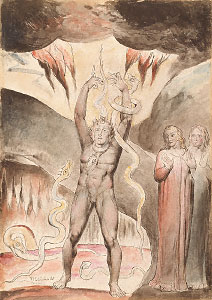Inferno: Canto XXV: 1-15:
Rejoice, O Florence, since thou art so great,
That over sea and land thou beatest thy wings,
And throughout Hell thy name is spread abroad!
Among the thieves five citizens of thine
Like these I found, whence shame comes unto me,
And thou thereby to no great honour risest.
But if when morn is near our dreams are true,
Feel shalt thou in a little time from now
What Prato, if none other, craves for thee.
And if it now were, it were not too soon;
Would that it were, seeing it needs must be,
For 'twill aggrieve me more the more I age.
We went our way, and up along the stairs
The bourns had made us to descend before,
Remounted my Conductor and drew me.
And following the solitary path
Among the rocks and ridges of the crag,
The foot without the hand sped not at all.
Then sorrowed I, and sorrow now again,
When I direct my mind to what I saw,
And more my genius curb than I am wont,
That it may run not unless virtue guide it;
So that if some good star, or better thing,
Have given me good, I may myself not grudge it.
As many as the hind (who on the hill
Rests at the time when he who lights the world
His countenance keeps least concealed from us,
While as the fly gives place unto the gnat)
Seeth the glow-worms down along the valley,
Perchance there where he ploughs and makes his vintage;
With flames as manifold resplendent all
Was the eighth Bolgia, as I grew aware
As soon as I was where the depth appeared.
And such as he who with the bears avenged him
Beheld Elijah's chariot at departing,
What time the steeds to heaven erect uprose,
For with his eye he could not follow it
So as to see aught else than flame alone,
Even as a little cloud ascending upward,
Dante's Inferno Canto XXV
 |
| Vanni Fucci 'Making Figs' Against God 1824-27pen, ink and watercolour (NGV 20) Felton Bequest, 1920 National Gallery of Victoria |
Inferno XXV, 1-15.
Vanni Fucci had been bitten by a serpent, instantly transformed into ashes, and then,
like the phoenix, reconstituted into his former shape. This was his punishment for
robbing the treasury of San Jacopo in the Church of San Zeno, Pistoia, in 1293. Here
Vanni Fucci blasphemes against God with an obscene gesture. The flames rain down
on him from the dark cloud above and serpents renew their attacks on him.
Vanni Fucci di Pistoia is a minor character in Inferno, the first part of Dante Alighieri's epic poem the Divine Comedy, appearing in Cantos 24 and 25. He was a thief who lived in
Pistoia, as his name ("di Pistoia" meaning "of Pistoia") indicates; when he died, he was sent to the eighth circle of Hell in the seventh bolgia (round; in Italian, "ditch" or "pouch"), where
thieves are punished. In that bolgia his punishment was to be stung by a serpent, reduced
to ashes, and then restored to his former shape for more torturing. Dante and Virgil meet
him and ask him why he was there. He replied that he stole a treasure from the Church of St. James in his hometown; he had accused an innocent man, Vanni della Nona, with the
crime, for which della Nona was executed. Fucci says he was not caught but he still went to Hell. He then predicts the overthrow of the Florentine Whites to spite Dante and then insults God by making obscene gestures at him, and is attacked by numerous nearby serpents and by the monster Cacus, who was put in the bolgia for stealing Hercules' cattle.
Pistoia, as his name ("di Pistoia" meaning "of Pistoia") indicates; when he died, he was sent to the eighth circle of Hell in the seventh bolgia (round; in Italian, "ditch" or "pouch"), where
thieves are punished. In that bolgia his punishment was to be stung by a serpent, reduced
to ashes, and then restored to his former shape for more torturing. Dante and Virgil meet
him and ask him why he was there. He replied that he stole a treasure from the Church of St. James in his hometown; he had accused an innocent man, Vanni della Nona, with the
crime, for which della Nona was executed. Fucci says he was not caught but he still went to Hell. He then predicts the overthrow of the Florentine Whites to spite Dante and then insults God by making obscene gestures at him, and is attacked by numerous nearby serpents and by the monster Cacus, who was put in the bolgia for stealing Hercules' cattle.
No comments:
Post a Comment